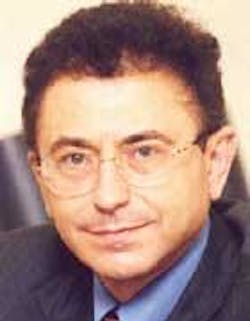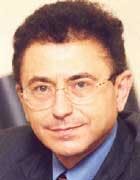POINT OF VIEW: TNK's Kukes: Russia must look to new markets for its oil
With its projected sustained growth of both oil production and exports, Russia must look for new markets in the US and Asia beyond its historical role as a "regional supplier (primarily to western Europe)," said Simon G. Kukes, president of Tyumen Oil Co. (TNK), Russia's fourth largest oil producer.
TNK is expected to be incorporated in a giant new Russian oil company, along with Sidanco Oil Co., under a deal led by BP PLC with Russian investors in both companies (see related stories, pp. 34-35)
Europe has become a saturated market, where high taxation suppresses any demand growth, said Kukes in an exclusive interview with OGJ during a recent visit to Houston. Europe's oil consumption is expected to increase to only 9.6 million b/d by 2010 from 9.3 million b/d in 2001. Moreover, Russian oil faces new competition in the European market from higher-quality Caspian crudes, he said.
Robust Russian growth
Russia's restructured, privatized oil industry has entered a period of "robust and sustainable growth" through operations by increasingly efficient private companies, Kukes said. Its oil exports are projected to increase to 4.5 million b/d in 2010 from 3 million b/d in 2001.
What's more, Kukes noted, new Russian production in Sakhalin and East Siberia is closer to non-European markets, particularly Japan and China.
The US, with its growing dependence on imported oil, also is a prime potential market for Russian crude, Kukes said. Total oil imports into the US are expected to jump to 12.3 million b/d in 2010 from 9.3 million b/d in 2001. Moreover, Kukes said, the commercial efficiency of spot shipments of Urals crude to the US is about 50¢/bbl lower than exports to Europe.
He said the US represents a potentially stable market for light, sour Urals-type crude, production of which is expected to inch up to 5.9 million b/d in 2005 and 6 million b/d in 2010 from 5.8 million b/d in 2001. He sees Russian oil entering the US market primarily as a displacement of other light, sour crudes.
With lifting costs generally under $3/bbl, he said, Russia can compete as a source of oil supplies for the US.
"So I think you'll see more and more cargoes coming," Kukes said. "By the end of 2003, you'll start to see a few hundred thousand barrels of Russian crude coming into the US market."
Potential partnerships
Kukes sees "potential partnerships for US companies to develop long-term supply contracts with us."
In time, he said, "The quality of Russian crude will improve, because I think the quality bank will be installed, and production of lighter crude will grow at a faster rate than sour. So I anticipate that maybe now, because of logistics, it is not easy to import (Russian oil into the US) at full scale, but at least we can test the market."
He said, "It is important to demonstrate that (exporting Russian oil to the US) is feasible to do. I think you will see more and more Russian crude in the US market, because, first thing, the US will import more oil. Although more (US) demand will be for lighter crude, the Urals (crude mix) will get lighter.
"In the meantime, demand in Europe will remain more or less flat, and with the high competition from Kazakhstan andUthe intense amount of oil product coming from Russia, then you might start to see price differentials between the Urals type of crude in Western Europe and in the US that would compensate for the logistics. Of course, if a deepwater port is built, then we can do it anyway, but it might be 5 years away."
TNK and Russia's state pipeline company Transneft, which almost fully monopolizes Russia's crude oil shipments by pipeline, have discussed the possibility of connecting existing pipelines with one in Croatia in order to move Russian crude to the Adriatic port of Omisalj for loading onto very large crude carriers. There also are potential new transportation routes north and south, Kukes said.
Pipeline routes
Four pipeline routes have been suggested for export of Russia's increased oil production. TNK anticipates 7% production growth over the next 5 years "primarily in western Siberia" said Kukes.
"I think we will go north" with a pipeline for that new production, he said. "I think we can easily build another 1 million b/d (of pipeline capacity) going north."
Russia's four top oil firms—TNK, OAO Lukoil, OAO Yukos, and OAO Sibneft—were to sign a preliminary deal in early December to build a major terminal in Murmansk on the Barents Sea to boost oil exports to the US (OGJ Online, Nov. 27, 2002). Their proposed plan includes building a 1,500 km link between Murmansk and Russia's existing pipeline network.
Together, the four firms account for more than a half of Russia's 6 million b/d of oil production.
Russia's lack of oil terminals capable of loading tanker consignments of 2 million bbl or more has long been viewed as the main obstacle to large-scale exports to the US market. But that obstacle could be overcome through development of the terminal at Murmansk, the only ice-free port in northern Russia capable of serving supertankers year-round.
It would reduce the cost of Russian oil exports, which now start at Novorissiysk on the Black Sea, and pass through the Bosporus Strait and the Mediterranean Sea before heading across the Atlantic Ocean. In 2002, Turkey adopted tough new rules to reduce tanker traffic through the narrow Bosporus Strait.
In addition to the proposed northern pipeline, Kukes said, "Russia for sure will go east (with new pipeline routes). Whether it goes to the Far East through Russian ports and then takes (the oil) to Japan and even California, or goes to China, it is not (yet) agreed upon. But definitely about 1 million b/d of pipeline (capacity) will be built in 5-6 years," he said.
In the effort to put more Russian oil into US markets, partnerships between Russian producers and US refiners "are (a) possibility," said Kukes. But without "a consistent logistics mechanism that gives us a cost advantage, I think long-term contracts for big volumes are not possible," he said. "We need first to test the water, which is what Yukos is doing, we are doing, Lukoil is planning to do; we need to test how it works (for) market penetration."
One problem in forming partnerships with US refiners, Kukes said, is that "there are not very many independent refiners." The big integrated multinational majors such as Royal Dutch/Shell Group and ExxonMobil Corp. "have their own strategies, company-wise," he said. "Shell and Exxon, when you work with them, you have to fit their long-term strategy. Anyway, I am optimistic, but it takes time."
US opportunities
As for opportunities for US and other western producers to share in the exploration and development of Russian oil and gas, Kukes said that, in the absence of a well-defined production-sharing agreement, "I think you'll see more joint ventures initially between Russian companies."
He said, "We're one of a very few companies in Russia that strongly supports a PSA. But there are some companies that oppose it in any form."
Development of a PSA "is important, because Russian companies realize that to get access to long-term capital with corporate issues involving governance and transparency, one of the attributes is to have a successful joint venture with western partners, and there is a very, very limited number of those between Russian oil companies and foreign (firms). I think there are a lot of upside opportunities there for both sides."
Kukes said, "To be attractive in Russia, (a firm) has to keep demonstrating that it can do transparent business with western companies. Unfortunately, not everybody in Russia feels yet the need for joint ventures. It's always happens that, when the price of crude is high, everything works—they can buy services, consultants. When things get tight, in a downturn cycle, then you'll see more joint ventures. Sometimes people have to learn by their mistakes."
What Russian companies are looking for in joint ventures, he said, is "definitely low-cost capital (and the) know-how to develop large oil fields." As for technology, Kukes said, "A lot of it you can buy from the service companies. But how to select the best—the bridging technology—this knowledge we definitely need." To help with the selection and implementation of western technology, he said, "We've hired quite a few Americans."
Technology developed for aerospace and military use under the old Soviet system was much too specialized and "isolated" to adapt to modern industrial use, Kukes said. He also doesn't see Russian service companies "developing to become world-class players—not on their own. I see more of joint ventures, when you combine some know-how that the Russians have with Western (companies), too."
Besides, with the growth of international oil field service companies, Kukes said, "There's no need for Russia to isolate again."
Career highlights
Simon G. Kukes is president of Tyumen Oil Co. (TNK), Moscow, Russia's fourth-largest producer. Born December 1946 in Moscow, Kukes became a US citizen in 1982.
Employment
Kukes began his professional career as a research associate at the USSR Academy of Sciences in 1973-76. Kukes later was named to a post-doctoral fellowship at Rice University, Houston, 1977-79, before joining Phillips Petroleum Co. as technical director, 1979-87. He served as vice-president, downstream, for Amoco Eurasia Corp. in 1987-96 and as executive vice-president, strategic planning, marketing, and trading, at OAO Yukos in 1996-98. Kukes joined TNK as president and a director in 1998.
Organizations
Kukes also is vice-chairman of Sidanco Oil Co., among the 10 largest oil and gas producers in Russia, and on the board of Parker Drilling Co., Houston. He is a senior visiting fellow at Princeton University, a honorary fellow at the US Foreign Policy Association, cochairman of the advisory council at the US Library of Congress, on the advisory board of the Dallas-based Maguire Energy Institute, on the board of the US-Russia Business Council, and a member of the Energy Policy Club at the Oxford Institute for Energy Studies.
Education
Kukes received a BS degree in chemical engineering from the Institute for Chemical Technology in 1969 and a doctorate in physical chemistry from the USSR Academy of Sciences in 1973.

